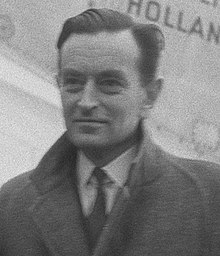
Back David Lean AN ديفيد لين Arabic ديفيد لين ARZ David Lean AST Дэвід Лін Byelorussian Дейвид Лийн Bulgarian ডেভিড লিন Bengali/Bangla David Lean BS David Lean Catalan David Lean Czech
David Lean | |
|---|---|
 Lean in 1952 | |
| Born | 25 March 1908 |
| Died | 16 April 1991 (aged 83) |
| Resting place | Putney Vale Cemetery, London, England |
| Occupations |
|
| Years active | 1930–1991 |
| Spouses | |
| Children | Peter Lean |
Sir David Lean CBE (25 March 1908 – 16 April 1991) was an English film director, producer, screenwriter, and editor, widely considered one of the most important figures of British cinema. He directed the large-scale epics The Bridge on the River Kwai (1957), Lawrence of Arabia (1962), Doctor Zhivago (1965), Ryan's Daughter (1970), and A Passage to India (1984).[1] He also directed the film adaptations of Charles Dickens novels Great Expectations (1946) and Oliver Twist (1948), as well as the romantic drama Brief Encounter (1945).
Originally a film editor in the early 1930s, Lean made his directorial debut with 1942's In Which We Serve, which was the first of four collaborations with Noël Coward. Lean began to make internationally co-produced films financed by the big Hollywood studios, beginning with Summertime in 1955. The critical failure of his film Ryan's Daughter led him to take a fourteen-year break from filmmaking, during which he planned a number of film projects which never came to fruition. In 1984, he had a career revival with A Passage to India adapted from E. M. Forster's novel. This was a hit with critics, but it proved to be the last film that Lean directed.
Lean is described by film critic Michael Sragow as "a director's director, whose total mastery of filmcraft commands nothing less than awe among his peers".[2] He has been lauded by directors such as Steven Spielberg,[3] Stanley Kubrick,[4] Martin Scorsese,[5] and Ridley Scott.[6] He was voted 9th greatest film director of all time in the British Film Institute Sight & Sound "Directors' Top Directors" poll in 2002.[7] He was nominated seven times for the Academy Award for Best Director, which he won twice for The Bridge on the River Kwai and Lawrence of Arabia, and he has seven films in the British Film Institute's Top 100 British Films (with three of them being in the top five)[8][9] and was awarded the AFI Life Achievement Award in 1990.
- ^ Bergan, Ronald (2006). Film. London: Doring Kindersley. p. 321. ISBN 978-1-4053-1280-6.
- ^ Sragow, Michael (1985). "David Lean's Right of 'Passage'". Film Comment. 21 (1): 20–27. JSTOR 43453017. Retrieved 19 July 2023.
- ^ Indiana Jones' Influences: Inspirations Archived 10 July 2017 at the Wayback Machine. TheRaider.net. Retrieved on 29 May 2011.
- ^ The Kubrick Site FAQ Archived 18 March 2017 at the Wayback Machine. Visual-memory.co.uk. Retrieved on 29 May 2011.
- ^ Cite error: The named reference
Collinswas invoked but never defined (see the help page). - ^ Ridley Scott's Brilliant First Film Archived 20 June 2016 at the Wayback Machine. newyorker.com (28 May 2012). Retrieved on 7 September 2017.
- ^ The directors' top ten directors Archived 29 September 2018 at the Wayback Machine. Bfi.org.uk (5 September 2006). Retrieved on 29 May 2011.
- ^ The BFI 100: 1–10 Archived 14 May 2011 at the Wayback Machine. Bfi.org.uk (6 September 2006). Retrieved on 29 May 2011.
- ^ The BFI 100: 11–20 Archived 3 June 2004 at the Wayback Machine Bfi.org.uk (6 September 2006). Retrieved on 29 May 2011.
© MMXXIII Rich X Search. We shall prevail. All rights reserved. Rich X Search